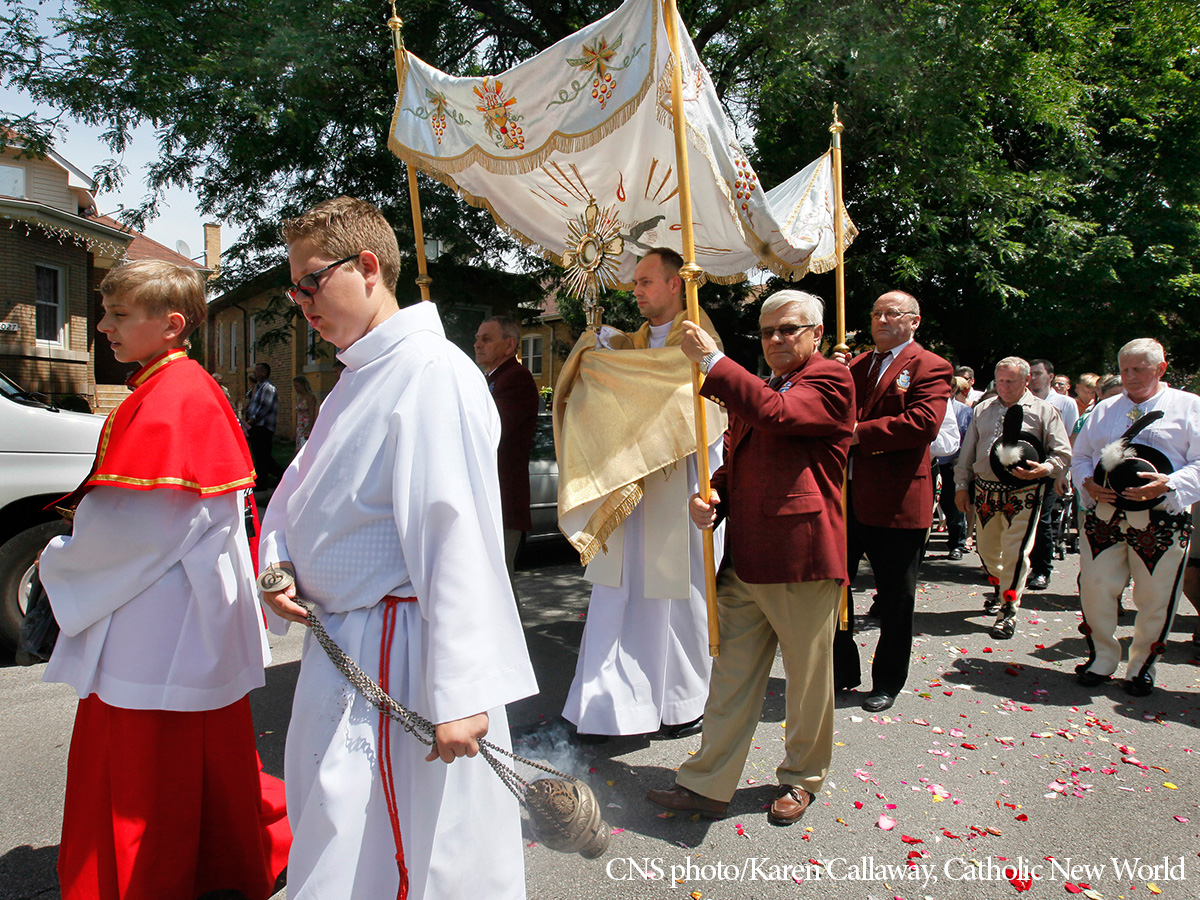The Solemnity of the Most Holy Body and Blood of Christ is celebrated on June 7. Mark the day by reading about and reflecting on what we mean by "The Real Presence of Jesus Christ in the Sacrament of the Eucharist."
The Eucharist is “the source and summit of the Christian life” (Lumen Gentium [Dogmatic Constitution on the Church], no. 11). In the Eucharistic Liturgy and our prayer before the Blessed
Sacrament, we encounter God’s presence in personal and profound ways. But the Eucharist is also social, as Pope Benedict XVI reminds us in Deus Caritas Est (God Is Love): “A Eucharist which
does not pass over into the concrete practice of love is intrinsically fragmented” (no. 14). The Eucharist, celebrated as a community, teaches us about human dignity, calls us to right
relationship with God, ourselves, and others. As the Body of Christ, it sends us on mission to help transform our communities, neighborhoods, and world. Church teaching, rooted in both Scripture and Tradition, emphasizes both the personal and social natures of the Eucharist. This guide highlights Popes Paul VI, John Paul II, and Benedict XVI’s writings about the social nature of the Eucharist. Their words challenge and move us to encounter Christ in the Eucharist in ways both
personal and social. Read more...
Tantum Ergo (prayer)
Down in adoration falling,
Lo! the sacred Host we hail;
Lo! o’er ancient forms departing,
newer rites of grace prevail;
faith for all defects supplying,
where the feeble senses fail.
To the everlasting Father,
and the Son who reigns on high,
with the Holy Spirit proceeding
forth from each eternally,
be salvation, honor, blessing,
might and endless majesty. Amen.
V/. You have given them bread from heaven,
R/. Having all delight within it.
Let us pray. O God, who in this wonderful Sacrament left us a memorial
of your Passion: grant, we implore you, that we may so venerate the sacred
mysteries of your Body and Blood, as always to be conscious of the fruit of
your redemption. You who live and reign forever and ever. Amen.
La Solemnidad del Santísimo Cuerpo y Sangre de Cristo se celebra el 7 de junio marca el día leyendo sobre y reflexionar sobre lo que entendemos por " La presencia real de Jesucristo en el Sacramento de la Eucaristía . "
La Eucaristía es la “fuente y cumbre de toda la vida cristiana” (Lumen Gentium [Constitución dogmática sobre la Iglesia], no. 11). En la liturgia eucarística y en nuestras oraciones ante el Santísimo Sacramento nos encontramos a la presencia de Dios de maneras personales y profundas. Pero la Eucaristía también es algo social, tal y como nos lo recuerda el papa Benedicto XVI en Deus Caritas Est (Dios es amor): “Una Eucaristía que no comporte un ejercicio práctico del amor es fragmentaria en sí misma” (no. 14). La Eucaristía, celebrada en comunidad, nos enseña acerca de la dignidad humana, nos llama a tener una relación recta con Dios, con nosotros mismos y con los demás, nos invita a la comunidad y a la solidaridad y nos envía en misión a ayudar y transformar nuestras comunidades, barrios y el mundo entero. La doctrina de la Iglesia, con sus raíces en la Sagrada Escritura y la Tradición, pone de relieve tanto la naturaleza personal como social de la Eucaristía. Esta guía destaca los escritos de Pablo VI, Juan Pablo II y Benedicto XVI acerca de la naturaleza social de la Eucaristía. Sus palabras nos retan y nos llevan a un encuentro con Cristo en la Eucaristía, tanto personal como social. Leer Más...
Tantum Ergo (oracion)

Honremos, pues, echados
por tierra, tan divino Sacramento;
y queden desechados,
pues vino el cumplimiento,
los ritos del Antiguo Testamento.
Y si el sentido queda
pasmado de tanta y nueva cosa,
lo que él no puede, pueda,
ose lo que él no osa,
la fe determinada y animosa.
Gloria al Omnipotente,
y al gran Engendrador y al Engendrado
y al inefablemente
de entrambos inspirado,
igual alabanza, igual honor sea dado. Amén.
V/. Les diste pan del cielo,
R/. Que en sí contiene todo deleite.
Señor nuestro, Jesucristo, que en este sacramento admirable nos
dejaste el memorial de tu pasión, concédenos venerar de tal modo los
sagrados misterios de tu Cuerpo y de tu Sangre, que experimentemos
constantemente en nosotros el fruto de tu redención. Tú que vives y reinas.
- Log in to post comments
